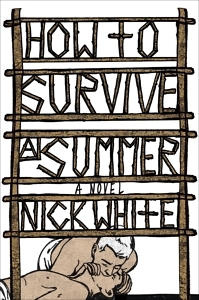At the center of Nick White’s striking debut novel, How to Survive a Summer, is the burden of a trauma lurking unconfronted in the human heart. For years the novel’s narrator, Will Dillard, has carried murky memories of Camp Levi, located in a remote stretch of Mississippi, where he suffered a summer of “gay conversion therapy.” When Will, now grown, learns that a slasher movie loosely based on the long-defunct camp is set for release, his experiences there come roaring back, arriving in fragments of memory, like the prayer campers cried before jumping into a polluted lake meant to purge them of impurity: “Lord, rend my flesh! Lord, burn me anew!”

This moment of profound disruption compels Will to set aside his current life in the Midwest and return to his native Mississippi, pursuing the truth of the past. As an adult, Will has buried himself in an academic half-life, noncommittally pursuing a Ph.D. in film studies. He specializes in stylish melodramas from the 1950s, but his dissertation progress has come to a halt. His friend Bevy attempts to draw him out of his brooding solitude and keep him connected to others through queer activism. Through Bevy, Will meets a charming Puerto Rican trans man named Zeus, and the possibility of this romantic connection makes Will nervous. His habit of disappointing the people closest to him makes him endeavor to keep that list of people small.
An only child raised in the parsonage of the Second Baptist Church of Hawshaw, Mississippi, Will, looking back, believes that even though he and his father became estranged, both of his parents were well-meaning. His father, whom he describes as “kind but wrongheaded,” had a grand vision of drawing African-American members into his all-white church—an experiment no one involved in seemed eager to embrace—but his understanding of inclusiveness did not include accepting a gay son.
Will’s mother offered her own version of comfort to the community in the form of her beloved casseroles and desserts. Alone with Will, she told haunting stories of an unsettled place in Mississippi called the Neck. “A nowhere land in between two counties,” the Neck is a strange contrast to the nearby Delta—“bad for growing,” she said, “but good for mischief.” Her tales gave Will a vision of resilience, rebellion, violence, and desire. But after his aunt and uncle—who came to be known, notoriously, as Mother Maude and Father Drake—established Camp Levi there, he learned firsthand what havoc that strange place could wreak on a person’s life.
 In How to Survive a Summer, Nick White creates a fresh road into a familiar story: the estranged Southern son returns home. Making the release of a slasher film—and the varying responses it inspires among queer audiences—as the inciting event for a confrontation with the past is a strategy that keeps the story contemporary enough to avoid the over-trodden tropes of Southern fiction. During the film’s opening week in theaters, Proud Flesh, as the flick is called, quickly evolves from a target of protests to a cult film, spawning pop-up viewing events in gay clubs. Will’s private memories are thus playing out publicly, even if stretched and altered to fit a Hollywood genre. This storyline provides a solid external motivation for Will to pursue the details of memories he has avoided for so long.
In How to Survive a Summer, Nick White creates a fresh road into a familiar story: the estranged Southern son returns home. Making the release of a slasher film—and the varying responses it inspires among queer audiences—as the inciting event for a confrontation with the past is a strategy that keeps the story contemporary enough to avoid the over-trodden tropes of Southern fiction. During the film’s opening week in theaters, Proud Flesh, as the flick is called, quickly evolves from a target of protests to a cult film, spawning pop-up viewing events in gay clubs. Will’s private memories are thus playing out publicly, even if stretched and altered to fit a Hollywood genre. This storyline provides a solid external motivation for Will to pursue the details of memories he has avoided for so long.
As a result, we have every reason to follow Will down this fascinating, heart-wrenching road. With How to Survive a Summer, Nick White has written a mesmerizing debut, weaving together long-cherished elements of Southern fiction with an unmistakably modern sensibility. In Will Dillard he has created a narrator we will gladly follow anywhere, and where he leads us does not disappoint. Like his mother with her stories of the dark past, Will tells a tale full of heartbreak, desire, and the unexpected costs of survival.

Emily Choate holds an M.F.A. from Sarah Lawrence College. Her fiction has been published in Shenandoah, The Florida Review, Tupelo Quarterly, and The Double Dealer, and her nonfiction has appeared in Yemassee, Late Night Library, and elsewhere. She lives in Nashville, where she’s working on a novel.
Tagged: 2017 Southern Festival of Books, Fiction





